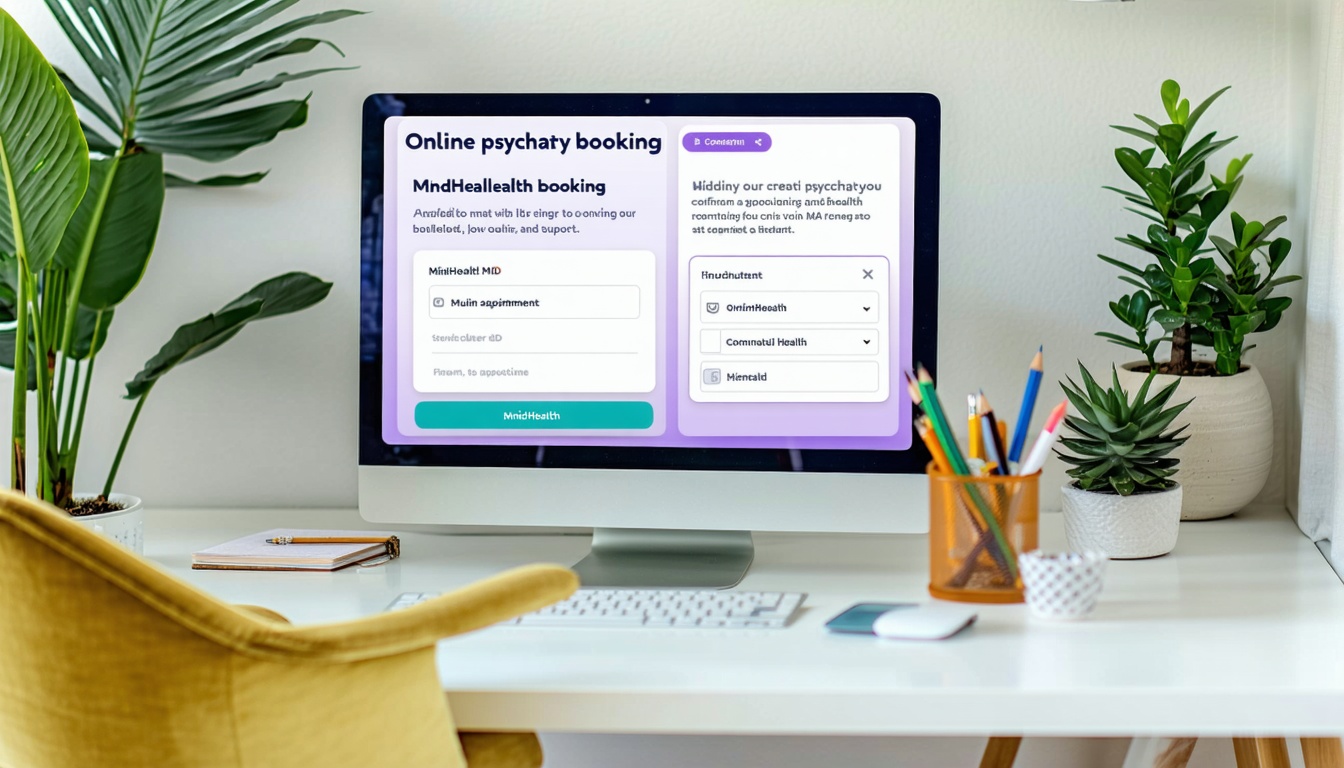Learn the intake basics
Scheduling your adult psychiatry intake appointment can feel both exciting and nerve-wracking. While you might wonder what’s involved or whether it’s worth the effort, rest assured that this first step is crucial in understanding and improving your mental well-being. About one in five adults in the United States lives with a diagnosable mental disorder, and one in 24 has a serious mental illness [1]. These statistics highlight how common mental health challenges really are, so you’re certainly not alone.
With the intake appointment, you’re allowing a psychiatrist to explore your symptoms, medical history, and personal goals to plan a tailored treatment. This might involve medication, therapy, or even lifestyle tweaks. In this article, you’ll learn exactly why an evaluation helps, how to prepare for the big day, the questions you can expect, and the reasons MindHealth MD is an excellent partner in your telehealth journey, especially if you’re unsure where to begin. Let’s dig in.
Why an evaluation is helpful
-
It identifies core issues: The adult psychiatry intake appointment is your opportunity to discuss emotional turmoil, symptoms of anxiety, ongoing mood swings, or unhelpful behaviors. Psychiatrists are trained to spot patterns, potential diagnoses, and risk factors you might overlook on your own.
-
It personalizes treatment: Getting an accurate sense of your medical and mental health background helps in drawing up a plan that addresses your exact needs. Whether you’re dealing with depression or exploring specialized treatments like MAT (medication assisted treatment) for alcohol or opioid addiction, clarity on your current situation leads to better outcomes.
-
It sets a baseline: The intake session functions like a mental health baseline, capturing your current challenges and stressors. If you’re experiencing coexisting conditions, a psychiatrist can note them right away to form a more holistic approach.
What to expect overall
Psychiatry intake appointments typically last around 45 to 60 minutes, although the initial session can sometimes extend to 90 minutes if your history is complex [2]. Expect your psychiatrist to ask questions on a wide range of topics, from family history to daily habits. You’ll share details about your lifestyle, emotional struggles, and prior treatments. Since this can sometimes uncover sensitive memories or trauma, remember that it’s always within your rights to skip a question if it feels too uncomfortable [3].
By the end of your appointment, you might leave with a preliminary plan covering medication options or therapy recommendations. Plus, your psychiatrist could suggest scheduling follow-ups or advanced diagnostics. For instance, at MindHealth MD, we sometimes recommend an eeg brain mapping test or an eeg diagnostic for mental health, if the clinical picture hints at underlying patterns that an EEG might clarify.
Prepare for your appointment
Gather essential documents
Preparation sets you up for a smoother intake process. Start by collecting pertinent records, such as:
- Your identification and insurance card(s)
- Previous mental health evaluations or notes from past providers
- A list of current medications (include dosages)
- Summaries of family psychiatric history
Having these on hand helps your psychiatrist piece together your timeline quickly. If you’re uncertain about insurance coverage, consider reviewing insurance accepted psychiatry options to ensure your session costs are manageable.
Outline your health history
Before heading in, jot down personal events or health milestones that might affect your mental state. Think through the last few years. Have there been major life changes? Episodes of intense sadness or panic? Substance use concerns? The more honest you are about your medical and personal background, the more targeted your final treatment plan will be. This is also a good time to talk with close family members who might recall relevant details you’ve forgotten.
Set personal goals
Ask yourself: what do I want from my adult psychiatry intake appointment? Maybe you’re struggling with anxious thoughts before bed, hoping for relief from chronic depression, or needing help addressing addictive behaviors through mat for opioid addiction. Having clear goals helps you and your psychiatrist focus on the most pressing issues. If possible, take brief notes with bullet points:
- Sleep quality and patterns
- Mood fluctuations or triggers
- Stress factors (work, relationships, health)
- Concerns about substances or habits
These notes can make your conversation flow more smoothly.
Navigate your first session
Typical questions your psychiatrist asks
Don’t be surprised if your psychiatrist asks what feels like a million questions. This is normal. They’re likely to explore:
- Current and past symptoms you’ve experienced (e.g., mood swings, panic attacks)
- Everyday details like job, education, or relationships
- Physical health conditions and any relevant treatments
- Medicines you’ve tried, including effects or side effects
- Possible family history of mental illness
If you’re leaning toward telehealth sessions, you can also learn more about how a telepsychiatry appointment allows you to explore all these aspects from the comfort of home. Telehealth psychiatry can be ideal if you face scheduling hurdles or have mobility constraints.
What if you feel uneasy?
It’s completely normal to feel awkward, embarrassed, or even tearful. Psychiatrists expect emotional reactions. You’re discussing personal matters that might be tough to share. If tears flow, tissues will be within reach. If certain topics elicit fear or shame, speak up. The intake is meant to be a safe space, and you are in control of what you choose to share.
Remember that you can pause to gather your thoughts or catch your breath. Your psychiatrist can guide the conversation at a pace that suits you. If needed, you can schedule a short break or politely let them know you’re feeling overwhelmed. Being honest is better than bottling up emotions. This honesty sets the stage for a successful and effective plan.
Share your concerns openly
If you’re truly worried about receiving a particular diagnosis or being pushed toward medication, voice your hesitations. A reputable psychiatrist welcomes questions. You might also have strong opinions on the types of therapy you prefer, like cognitive behavioral therapy (CBT) or group sessions, or you may be curious about advanced techniques such as tms therapy for depression. Having an open dialogue ensures you receive care tailored to you, rather than a one-size-fits-all approach.
Plan your immediate next steps
Discuss medication options
If your symptoms indicate that medication can help, your psychiatrist will outline possible medication types, dosages, and schedules. Don’t worry if you’re hesitant about starting medication right away. The decision is yours to make. You can ask for additional details or consider a follow-up conversation if you’re on the fence. Once you do choose a path, consistent psychiatric medication management helps track your progress and fine-tune the dosage.
Ask about therapy approaches
Medication alone is rarely the entire solution. You might benefit from exploring therapy with a licensed counselor, joining support groups, or combining your medication regimen with alternative treatments. If you’re dealing with traumatic events, you may want to consider specialized approaches like eye movement desensitization and reprocessing (EMDR). If your struggles relate to addiction, you can discuss a telehealth mat consultation. By asking questions, you can figure out which approach feels right.
Confirm follow-up appointments
Before you conclude the session, pin down your follow-up roadmap. Typically, you’ll meet your psychiatrist again within a couple of weeks, especially if you start medication that might cause side effects or require dose adjustments [2]. If you need more urgent help, a resource like immediate psychiatry appointment ensures you’re not left waiting in a crisis period.
Why choose MindHealth MD
With so many providers out there, you might wonder what sets MindHealth MD apart. Let’s walk through the key highlights:
Telehealth psychiatry that fits
Life is busy, and in-person visits aren’t always practical. If you’re juggling family, work, or mobility restrictions, telehealth can be a game-changer. Through MindHealth MD’s virtual psychiatry session, you can connect with a qualified psychiatrist from your living room. You’ll avoid commute hassles and have a calmer environment for discussing mental health challenges. Plus, we offer same day psychiatric evaluation for times when you need answers fast.
MAT for opioid or alcohol addiction
Struggling with substance use is more common than you might expect: from prescription opioids to alcohol dependency, it’s important to explore evidence-based solutions that address the root causes. Medication assisted treatment, or MAT, combines medication with counseling to manage cravings, block euphoric effects, or combat withdrawal. We offer specialized programs like mat for opioid addiction or mat for alcohol dependency. Our team ensures you receive thorough monitoring and emotional support throughout.
TMS for treatment-resistant cases
There are times when depression fails to respond to standard medication or talk therapy. That’s where TMS (Transcranial Magnetic Stimulation) can step in. By delivering magnetic pulses to specific brain areas, TMS can help people who face persistent depressive symptoms. At MindHealth MD, you can schedule tms treatment if your psychiatrist believes it might significantly boost your recovery. Our transcranial magnetic stimulation providers combine expertise with compassion, making sure you understand every step of the procedure.
In short, MindHealth MD emphasizes a personalized approach. Whether you need urgent assessment, consistent medication management, or advanced procedures like TMS or EEG-based insights, you’ll find thorough guidance at each step.
Make use of additional resources
Insurance and payment solutions
Worried about which insurance plans are accepted or whether you’ll end up paying out-of-pocket? MindHealth MD prides itself on offering in network psychiatry care options whenever possible, and we do our best to keep mental health support affordable. If you have questions, you can explore self pay psychiatry session info, too, especially if you prefer not to go through insurance.
Coupled with transparent pricing, we strive to eliminate financial barriers so you can focus entirely on feeling better. If at any point you need help understanding your coverage, call our office for assistance or check insurance accepted psychiatry for a clearer outline of your plan’s compatibility.
Exploring EEG for treatment planning
Sometimes, additional assessments like an eeg brain mapping test may be recommended. Certain mental health conditions can be associated with distinct patterns of brain activity. If an EEG reveals any relevant anomalies, this data helps your psychiatrist fine-tune your therapeutic approach. For instance, individuals with co-occurring disorders might benefit from more structured interventions if EEG data supports a particular diagnosis. A thorough evaluation might also point to co occurring disorders treatment to address both addiction and underlying mental health issues simultaneously.
Combining therapy and medication
A robust treatment plan often merges medication with talk therapy, group support, or complementary techniques (like mindfulness or TMS). If you’re dealing with depression, an online psychiatry booking can help you quickly set up a session. This dual approach—therapy plus medication—can be more effective than either strategy alone, according to multiple studies [4]. During follow-up sessions, you can share how treatments are working, whether side effects have appeared, and whether you need any adjustments.
FAQs about intake appointments
-
What questions will the psychiatrist ask me at the first meeting?
Your psychiatrist will likely inquire about your current symptoms, medical history, and family history. You’ll also discuss your lifestyle—things like work, social relationships, and stress levels. They might explore questions on trauma, substance use, or mood patterns. There’s no need to study for this. You simply share your experiences openly and honestly. -
Do I have to answer every question?
No. You are free to set boundaries. Psychiatrists understand that certain topics, such as past trauma or abuse, may be difficult to talk about at first. If you’re not ready, you can let them know you prefer to revisit that topic at another time [3]. -
How long is the adult psychiatry intake appointment?
An intake typically lasts around 45 to 60 minutes, though it can stretch up to 90 minutes or more if your situation is complex or you have an extensive history. Longer sessions are meant to ensure your psychiatrist gathers enough information up front, so they can create a detailed, personalized game plan. -
What if I don’t agree with the suggested treatment plan?
It’s your mental health journey. Open communication is key. If something in your plan doesn’t feel right, share your concerns. You might tweak medication approaches, ask for an alternative therapy, or even seek a second opinion. MindHealth MD encourages collaboration and respects patient feedback. -
How soon can I start TMS or MAT if needed?
This depends on your specific diagnosis, the severity of your symptoms, and your psychiatrist’s evaluation. If you’re dealing with severe depression that hasn’t improved with typical therapies, tms therapy for depression could be an option fairly early on. Similarly, if you need help with opioid or alcohol dependency, you might begin medication assisted treatment after initial labs or evaluations, sometimes as soon as a few days following your intake appointment.
Final thoughts
By making the most of your adult psychiatry intake appointment, you’re creating a strong foundation for a healthier future. Planning ahead—whether it’s organizing your documents, reflecting on concerns, or mapping out your goals—makes a huge difference. During the session, share openly. You might find the conversation initially uncomfortable, but honesty is the key to receiving the most accurate diagnosis and the most suitable treatment plan.
If you’re exploring telehealth solutions, MindHealth MD is here to simplify the process. Our online psychiatry booking system helps you schedule sessions quickly. Plus, we offer advanced services such as TMS for treatment-resistant depression and MAT for addiction concerns. We accept many insurance plans, provide self-pay options, and keep your comfort a priority every step of the way.
You deserve support that listens without judgment, suggests evidence-based treatments, and respects your unique background. By choosing a provider who matches your needs—be it telehealth convenience, specialized EEG insights, or quick-turnaround appointments—you’ll be set up for significant progress. Take the next step. Reach out, book your intake appointment, and remember that every question asked during that crucial first session is one more puzzle piece in the bigger picture of your wellness journey. Your time to feel better starts now.








